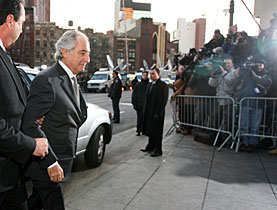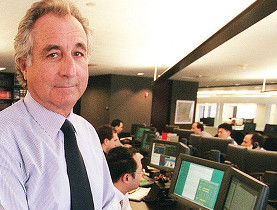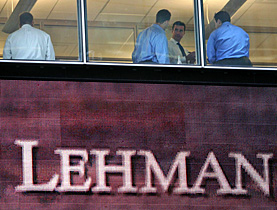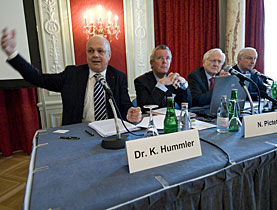Swiss institutions brace for Madoff fallout

Financial criminal Bernard Madoff was sentenced to 150 years in prison on Monday after his $65 billion (SFr70 billion) fraudulent investment scheme went bust.
United States District Court Judge Denny Chin handed the maximum sentence to the 71-year-old investor, who perpetrated Wall Street’s biggest-ever fraud. The New York court erupted into cheers.
Madoff’s lawyers had sought 12 years in prison, while prosecutors wanted the maximum.
Chin called the fraud “staggering” and noted that it spanned more than 20 years. He said: “the breach of trust was massive.”
The scam affected institutions and investors in Switzerland and around the world. Regulators and the legal system must now decide who else shares the blame.
Bernard Madoff, a former Nasdaq chairman, duped many of the world’s wealthiest people into investing in his Ponzi scheme – an illegal operation that pays clients with the money of new investors rather than with genuine profits. He pleaded guilty to securities fraud and other charges in March and had been jailed since.
Clients of Swiss-based financial institutions or foreign funds administered by Swiss banks are estimated to have lost billions of dollars when Bernard L Madoff Investment Securities unravelled at the end of last year.
Switzerland was by no means the worst affected financial centre in the scandal but private banks such as Union Bancaire Privée (UBP), Reichmuth, Banque Bénédict Hentsch and Notz, Stucki & Co funnelled clients’ money into the fraudulent scheme.
Legal action
Directors at Geneva-based wealth manager Aurelia Finance are facing criminal charges while Optimal Investment Services, a hedge fund of Spain’s Banco Santander that is headquartered in the city, was also caught out by the con. Optimal has offered to pay back some of the losses to clients, along with UBP and Notz Stucki.
In addition, Swiss banking giant UBS had its fingers burned after helping clients to funnel funds into the Madoff scheme via two investment funds it administered in Luxembourg. These funds are now being wound down and UBS said it never advised clients to invest with Madoff, but angry clients are still demanding their money back.
Prominent Zurich financial lawyer Daniel Fischer told swissinfo.ch that institutions and possibly individuals could face a raft of legal action from within Switzerland and from other countries.
“How could this happen when we had a lot of signals and alerts that this [the Madoff fund] could not be OK?” he said. “If someone does not want to see the consequences because they are earning good fees then it could be negligence. Madoff pulled the money, rather than the wool, over people’s eyes.”
Regulation questioned
Fischer is gathering clients together with the aim of presenting a class action, but feels many cases may well be settled out of court.
The case has also cast doubt over the effectiveness of regulators that apparently ignored numerous warnings about Madoff’s scheme.
The European Union has signalled its intent to get tough with alternative investments, but Matthaus von Otter of the Swiss Funds Association believes this would unfairly hinder the majority of hedge funds that were not affected by Madoff.
“We consider the EU directives to be outright protectionism and a menace to the business model,” he told swissinfo.ch. “In Switzerland there is not much more to be done in the regulatory field because collective investment schemes are already regulated here.”
“Smelt a rat”
The Swiss Bankers Association was also at pains to point out that most banks were not caught up in the Madoff scandal. Some, including Credit Suisse, actively encouraged clients to withdraw money from the suspect scheme.
“While a couple of Swiss banks were affected by the fraud, the vast majority smelt a rat quite early on because they could find no rational explanation as to how Mr Madoff’s investment business was generating its impressive and consistent returns,” spokesman James Nason told swissinfo.ch.
Matthew Allen, swissinfo.ch and agencies
Bernard Madoff founded Bernard L Madoff Investment Securities on Wall Street in 1960. He started the fraudulent Ponzi scheme in the 1990s.
The scheme attracted approximately $65 billion of funds by the time the fraud was discovered in December 2008. Madoff ran the fund as an exclusive club, attracting money from Jewish charities and a host of wealthy people, including Steven Spielberg, according to reports.
The fund was run with strict secrecy and ran internal audits. Many financial institutions sounded alerts about a possible Ponzi scheme, but regulators admitted that they did not investigate these warnings thoroughly enough.
On December 10, 2008, Madoff was arrested in the US after allegedly admitting to his sons that the scheme was “one big lie”.
In March, Madoff pleaded guilty in court to 11 charges including fraud, perjury and money laundering. He said he was “deeply sorry and ashamed”.
Madoff was sentenced to 150 years in prison on June 29.
Charges have also been laid against alleged accomplices in the fraud.

In compliance with the JTI standards
More: SWI swissinfo.ch certified by the Journalism Trust Initiative




You can find an overview of ongoing debates with our journalists here. Please join us!
If you want to start a conversation about a topic raised in this article or want to report factual errors, email us at english@swissinfo.ch.